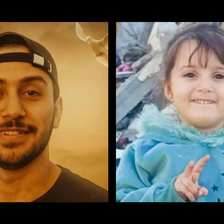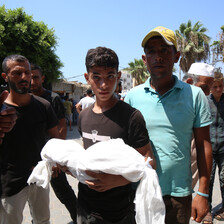The Electronic Intifada 5 May 2024

Abd al-Rahman Abu Salem
We were haunted by death and fear in Rafah.
Amid Israel’s threats to conduct a ground invasion in that southern Gaza city, our family fled for Nuseirat refugee camp in the Middle Area.
The move did not bring us any safety. Israel has been indiscriminately attacking civilians’ homes in Nuseirat.
Here my brother Abd al-Rahman has unexpectedly emerged as a hero.
Not long ago, he was a 20-year-old student of information technology. Now he is a saver of lives.
Each time there is an explosion nearby, Abd rushes to the scene.
He comes back to us in one of two emotional states. He is happy when he saves lives, sad when he arrives too late or fails to rescue anyone.
Late at night on 7 April, Israel launched an airstrike against Nuseirat. The area affected was just 250 meters from our tent.
When Abd got to the scene, he found that four adjacent buildings had been destroyed.
It was pitch black and Abd only had the light from his cellphone.
“I found myself facing a big wall,” he said. “I looked up to the second floor ceiling and saw a toddler’s hand hanging from a slanted wall.”
A doctor tried to resuscitate the child, while a quadcopter flew above.
Tragically, the child could not be saved.
The following day – at 5 am – we were awakened by an explosion about 100 meters away from us.
When Abd sprang out of bed, my father pleaded with him not to go anywhere as the bombardment was still taking place.
Abd insisted on going.
“I don’t want to be late,” he said. “I don’t want to lose more people.”
Once he reached the scene, Abd saw a five-floor building engulfed in flames. The emergency services had not yet arrived.
“Bring buckets of water to put out the fire,” Abd told the neighbors.
Determined
Suddenly, he heard a woman calling out, “I’m here.”
Looking up, he found the woman trapped between the floors of the building. He tried to climb to the roof.
At first, he couldn’t reach her.
Abd shouted as loud as he could, seeking that a ladder be brought to him.

Israel has been indiscriminately attacking civilians in Nuseirat refugee camp.
APA imagesWhen he managed to reach the woman, he recognized her. She is known as Um Ziyad and had been one of our neighbors.
The ceiling of the second floor had collapsed on her and she could not move her legs.
The woman shouted that Abd should save her son Ziyad first.
Abd didn’t know where Ziyad was. As Abd had to focus on getting the woman out alive, he nonetheless assured her that Ziyad was safe.
As Abd freed her legs and started to lift her from the rubble, she said, “Bring me something to cover my hair.”
And so Um Ziyad was rescued and reunited with her 4-year-old daughter.
Then something terrible happened. Abd discovered the lifeless body of Ziyad buried beneath the rubble.
Ziyad was only 7.
Civil defense workers had just arrived. Their equipment was rudimentary.
“How can we get this body out?” Abd asked them.
They told him that extracting Ziyad was nearly impossible. To do so, Abd would have to continue breaking stones for hours.
Abd was determined to get Ziyad’s body out of the rubble, so that the boy could have a decent burial.
For the next two and a half hours, Abd kept chipping away at the rubble.
Ziyad’s body was covered in blood. There was shrapnel inside his abdomen, which Abd removed.
“It was a horrible and heartbreaking scene,” Abd said. “I uncovered Ziyad’s face, only to see his blue eyes out of their sockets. I carefully placed them back in place.”
“I took the watch off his wrist and kept it so that I could give it to Um Ziyad as a memory of her son,” he added. “Then I covered the body.”
My brother has nightmares.
Every so often, he wakes up shouting “Ziyad has been killed.”
My mother tries to calm Abd down.
“But you managed to rescue Ziyad’s mother and his sister,” she says. “And he is happy about that.”
My mother is worried about Abd. Every time he comes back with his shirt covered in blood, my mother fears that he has been shot or otherwise injured.
She tells Abd that she fears for him.
Abd replies, “I fear for those people that I may not be able to reach in time.”
Despite his nightmares, Abd’s resolve remains unbroken.
He hopes that if we are trapped, someone will be able to rescue us.
Razan Abu Salem is a writer and translator based in Gaza.





